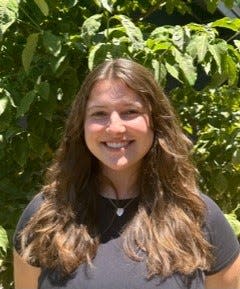Opinion: Asheville 20-year-old sees hope after Roe v. Wade overturn with 2024 election
There was no preparation for the culture shock I would experience on the morning of my very first day of school back in America. I was stunned as I watched my peers face the flag, put their hands over their hearts, and recite the Pledge of Allegiance. Not knowing the words, I tried to imitate them by putting my hand over my heart and mouthing fake words.
My American family had been living in London for the early years of my childhood. After seven years abroad, I left behind my Catholic school uniform and my English accent and moved to Asheville, where I would start the fourth grade. As I later discovered, the point of reciting the Pledge is to instill a sense of patriotism in young Americans and to underline the ideals of liberty, justice and equality. These ideals appear in our founding documents, our national anthem, and more recently, on T-shirts and bumper stickers. Over the past decade I have tried to decipher whether these ideals are a true reflection of the American government or merely a fiction.
Recent events and the current political climate have made me fear that liberty, justice and equality are only a fiction. The freedoms that our mothers and grandmothers fought so hard for are being taken away from us little by little. As a now 20-year-old woman working towards a career in the American government, I am often discouraged by the state of our democracy and fear for the future of my generation. I wonder, is there hope?
In particular, recent decisions by the Supreme Court have fueled my fears for our democracy. In June of 2022, SCOTUS overturned Roe v. Wade, the landmark piece of legislation that made access to abortion a federal right in the U.S. I felt hopeless and angry as I watched my rights and nearly five decades of progress shrivel away. Women losing their right to make choices about their own bodies feels like we are backpedaling in time, further away from the American ideals we claim to uphold.
More: Opinion: My placenta, my choice: Why are NC women being forced to act as life support?
My fears only increased when SCOTUS struck down race-based affirmative action in college admissions last month. The decision means that race cannot be considered as a factor in college admissions. The decision, however, fails to recognize historic racial inequities in education and conveniently overlooks the special considerations already given to legacy status, wealth, employee connections and athletic recruitment. This decision results in continued favoritism of white and privileged applicants, directly antithetical to the ideal of equality in our country.
Again, I wonder, is there hope? My answer, remarkably, is yes. As it is a deeply personal issue, the overturning of Roe v. Wade saw a bitter response from much of the American public. It was a key motive for voters in the 2022 midterm elections. High voter turnout, especially among women, blunted the widely expected conservative sweep. Essentially, citizens took matters into their own hands by voting to uphold American ideals of personal freedom.
It is my hope the American public will feel the same sense of urgency toward affirmative action as many of us did following the overturning of Roe v. Wade. Creating a diverse community in education is essential to learning. Shortly after the SCOTUS decision, my university issued a statement. In the concluding paragraph, Boston University President Robert A. Brown affirmed that “Our obligation is to be an academic community devoted to inclusive excellence in everything we do and to ensure that our community is welcoming, inclusive, and accessible so that it can be a shining example for how our society can move forward in making our ideals realities.”
More: Opinion: Women's History Month reminder: Equal rights for women still not legally ratified
More: Editor: Open call for women to share their voices, during Women's History Month and always
Yet, hope alone is not enough. We need action. I will be voting in my first presidential election in 2024. Looking forward to that, I’ve taken advantage of many opportunities this summer to help me make informed decisions. I am opening discussions with my peers on pressing issues. I am diversifying my news sources at the local and national levels. I am connecting with my community by attending events such as the Asheville Ideas Fest where I heard New York Times columnist Thomas Friedman discuss the changing world.
My new directions are to become more involved in civil society and listen more carefully to the ideas and experiences of others. I am excited to take these new perspectives with me to the voting booth. I hope that you will join me.

Katherine Bauer is an Asheville resident and student at Boston University, where she is majoring in international relations and minoring in French and political science.
This article originally appeared on Asheville Citizen Times: Opinion: 20-year-old Asheville woman hopes for women's rights in 2024
